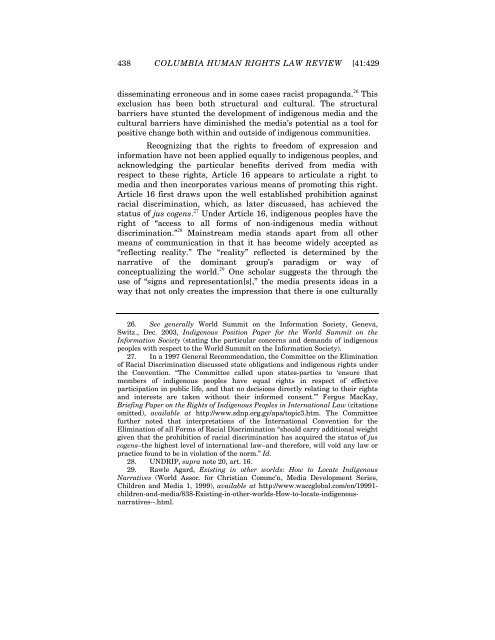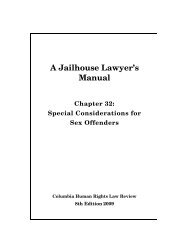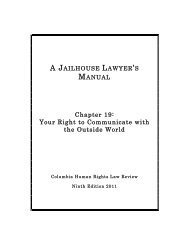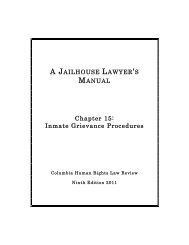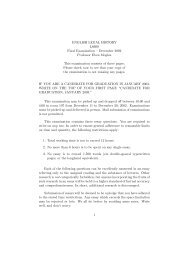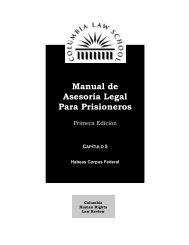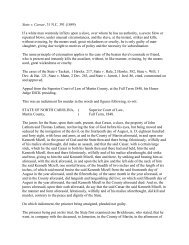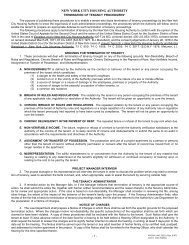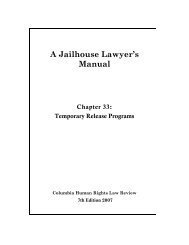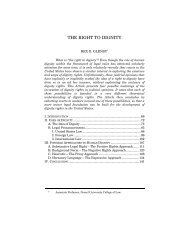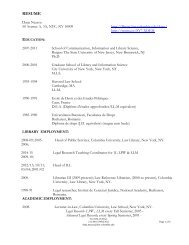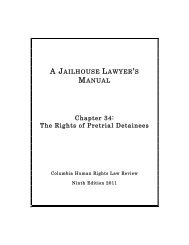A Right to Media? Lorie M. Graham - Columbia Law School
A Right to Media? Lorie M. Graham - Columbia Law School
A Right to Media? Lorie M. Graham - Columbia Law School
Create successful ePaper yourself
Turn your PDF publications into a flip-book with our unique Google optimized e-Paper software.
438 COLUMBIA HUMAN RIGHTS LAW REVIEW [41:429<br />
disseminating erroneous and in some cases racist propaganda. 26 This<br />
exclusion has been both structural and cultural. The structural<br />
barriers have stunted the development of indigenous media and the<br />
cultural barriers have diminished the media’s potential as a <strong>to</strong>ol for<br />
positive change both within and outside of indigenous communities.<br />
Recognizing that the rights <strong>to</strong> freedom of expression and<br />
information have not been applied equally <strong>to</strong> indigenous peoples, and<br />
acknowledging the particular benefits derived from media with<br />
respect <strong>to</strong> these rights, Article 16 appears <strong>to</strong> articulate a right <strong>to</strong><br />
media and then incorporates various means of promoting this right.<br />
Article 16 first draws upon the well established prohibition against<br />
racial discrimination, which, as later discussed, has achieved the<br />
status of jus cogens. 27 Under Article 16, indigenous peoples have the<br />
right of “access <strong>to</strong> all forms of non-indigenous media without<br />
discrimination.” 28 Mainstream media stands apart from all other<br />
means of communication in that it has become widely accepted as<br />
“reflecting reality.” The “reality” reflected is determined by the<br />
narrative of the dominant group’s paradigm or way of<br />
conceptualizing the world. 29 One scholar suggests the through the<br />
use of “signs and representation[s],” the media presents ideas in a<br />
way that not only creates the impression that there is one culturally<br />
26. See generally World Summit on the Information Society, Geneva,<br />
Switz., Dec. 2003, Indigenous Position Paper for the World Summit on the<br />
Information Society (stating the particular concerns and demands of indigenous<br />
peoples with respect <strong>to</strong> the World Summit on the Information Society).<br />
27. In a 1997 General Recommendation, the Committee on the Elimination<br />
of Racial Discrimination discussed state obligations and indigenous rights under<br />
the Convention. “The Committee called upon states-parties <strong>to</strong> ‘ensure that<br />
members of indigenous peoples have equal rights in respect of effective<br />
participation in public life, and that no decisions directly relating <strong>to</strong> their rights<br />
and interests are taken without their informed consent.’” Fergus MacKay,<br />
Briefing Paper on the <strong>Right</strong>s of Indigenous Peoples in International <strong>Law</strong> (citations<br />
omitted), available at http://www.sdnp.org.gy/apa/<strong>to</strong>pic3.htm. The Committee<br />
further noted that interpretations of the International Convention for the<br />
Elimination of all Forms of Racial Discrimination “should carry additional weight<br />
given that the prohibition of racial discrimination has acquired the status of jus<br />
cogens–the highest level of international law–and therefore, will void any law or<br />
practice found <strong>to</strong> be in violation of the norm.” Id.<br />
28. UNDRIP, supra note 20, art. 16.<br />
29. Rawle Agard, Existing in other worlds: How <strong>to</strong> Locate Indigenous<br />
Narratives (World Assoc. for Christian Commc’n, <strong>Media</strong> Development Series,<br />
Children and <strong>Media</strong> 1, 1999), available at http://www.waccglobal.com/en/19991-<br />
children-and-media/838-Existing-in-other-worlds-How-<strong>to</strong>-locate-indigenousnarratives--.html.


